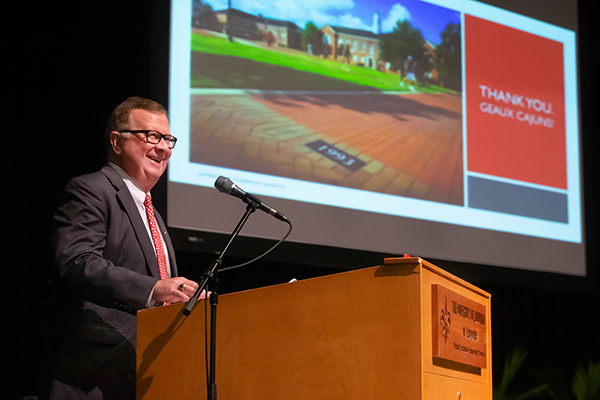The University of Louisiana at Lafayette spent a record $124.7 million on research and development last year.
Dr. Joseph Savoie, UL Lafayette president, announced the milestone during his State of the University address Wednesday. The annual speech to faculty and staff marks the start of the fall semester and the new academic year. Classes at UL Lafayette begin Monday.
It’s the second consecutive year the University expended more than $100 million on R&D, according to the Higher Education Research and Development Survey. The HERD Survey is the National Science Foundation’s annual index of research spending.
UL Lafayette competes against other universities and private development firms for federal and state government grants and industry contracts. The University manages the funding that faculty researchers secure.
The $124.7 million total “is an incontrovertible statement that these entities value what our faculty researchers are doing” and are willing to support their efforts, Savoie said.
In 2013, the University set a goal of $100 million in R&D expenditures by 2020. It reached the threshold in 2017, three years ahead of schedule. The 2017 total placed UL Lafayette 153rd – in the top 25 percent of the 644 institutions the HERD Survey included.
The University’s ranking for 2018, based on the $124.7 million figure, has not been released by NSF.
Over the last seven years, R&D funding secured by University scientists grew by nearly 90 percent, while UL Lafayette engineers saw a 200 percent increase. Funding in disciplines other than science and engineering improved by 60 percent, Savoie said.
More than 90 percent of funding to University researchers since 2012 came from federal sources. State contracts and awards more than doubled during the same period.
Savoie said the numbers reflect UL Lafayette’s sustained efforts to grow and safeguard its intellectual property portfolio through patents. The process protects products when they are made publicly available, and the University receives a portion of any revenue the inventions make once they enter the marketplace.
“We are a public university, and as a public university, the work done here should be for the public good,” Savoie said.
In a related announcement, he said UL Lafayette has been asked to join the National Academy of Inventors, a global group of 250 universities that encourages and supports inventors working in academic settings.
During his half-hour address in Angelle Hall on campus, Savoie also gave an overview of the University’s finances.
He noted UL Lafayette remains dependent on self-generated revenue following nearly a decade of state cuts to higher education funding. During the 2008-09 fiscal year, the University received 66 percent of its revenue from the state; in 2018-19, it received 27 percent.
State appropriations make up 13.9 percent of overall revenue, while the largest portion – more than 40 percent – comes from student tuition and fees. “This is why we remain dependent on everyone’s efforts to support recruitment and retention of students,” Savoie said.
Also Wednesday, Dr. Jaimie Hebert, provost and vice president for Academic Affairs, gave his forecast for the “perfect storm” approaching the University next year.
In 2020, UL Lafayette will undergo reaccreditation, set its strategic goals for the subsequent five years, and launch a new Quality Enhancement Plan, or QEP, focused on student research experiences.
The QEP is part of the reaccreditation process, Hebert explained. Accreditation bodies, such as the Southern Association of Colleges and Schools, permit universities to select what they want to emphasize. Following campus-wide discussions among faculty and staff, UL Lafayette chose to focus on student research.
The University has long stressed research among its undergraduate and graduate students, Hebert said.
The QEP “takes one of our points of pride, formalizes it, incorporates it into our curriculum, and allows us to expand access to experiential learning for a broader array of students across our campus.”
Photo caption: Dr. Joseph Savoie, UL Lafayette president, concludes his annual State of the University address Wednesday. (Photo credit: Doug Dugas / University of Louisiana at Lafayette)
